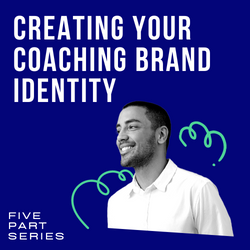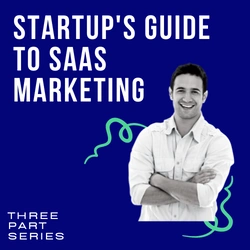The Most Important Client Getting Strategy For Your Coaching Business: Relationship Marketing
By now, you’ve most likely seen an ad or two for Canva, the online graphic design platform. The company has raised over $300 million dollars from investors and is aggressively building out their platform and spending millions a month on advertising. You can sign up and use Canva for free and eventually upgrade to a paid Pro plan for just $13 a month.
If it sounds like I’m trying to sell you on Canva, I’m not. My point is simple – Canva’s freemium business model and low cost of entry to upgrade makes it easy to sell. It doesn’t need a personality or face behind it. It doesn’t need to develop a relationship and build trust with its demographic to convert triers to buyers. Canva merely needs to make you aware that it exists – it needs a simple brand marketing campaign.
Coaching and niche or expertise-driven membership sites need considerably more than that. To convince an individual that your expertise and personal service is worth their hard-earned money each month, they must develop confidence and trust in you.
Frankly, Canva doesn’t need relationship marketing, but you do.
What exactly is relationship marketing?
Relationship marketing is a long-term strategy that emphasizes customer retention and loyalty over sales and short-term results. Even the metric used in relationship marketing is a little different as it focuses on the overall long-term value of customer relationships and now includes maintaining a strong connection to customers through multiple platforms and mediums. Upselling and sales transactions are no longer the point. The goal is to maintain strong relationships and deep levels of satisfaction with each customer, thereby lowering customer acquisition costs over time and powering a force of happy customers for client referrals, recommendations, positive reviews, and social media engagement.
A well-conceived relationship marketing plan will include using customer interactions with the company throughout social media campaigns, inbound marketing, press releases and strategic content.
Do you think Canva cares about any of that? Absolutely not, and it would be a waste of their time and resources. But a coach seeking to develop a long-lasting and profitable client base can’t ignore relationship marketing.
Why? Because coaches and niche membership sites are selling community, personality, expertise, and support. Oftentimes a good coach is selling a one-on-one personal service, and I’m sure that would cost over $13 a month. If you want to land clients consistently for $100, $300, or even $1,200 a month, relationship marketing is the only evergreen method.
After all, people purchase from those who they know, like, and trust. Your potential clients need to know that you’re a real person with real feelings who cares about them and not just their monthly membership fee. They need to feel comfortable with you, and they need to recognize your expertise and authority in your subject. That often means they need to hear recommendations from other, very real, people. They need to see social media engagement praising your services and social media posts that are receiving comments from happy clients.
They need to know you’re the real deal and won’t take their money and leave them high and dry. Likewise, they have the power to make the purchase, you need to empower them to choose you and not someone else.

The many advantages of relationship marketing:
Authority
For years, coaches saved their best material and most coveted knowledge for their top-tier clients, who are paying $1,000+ a month. It’s logical to think like that, but times have changed. Now it’s important that you share your knowledge, experience, real-world examples, and personal stories for free. Let anyone who clicks into your site, finds your Facebook page, or watches your videos realize immediately that you are an authority figure on the topic. To win clients and keep them long-term you must prove your expertise and what better way to do that than by sharing it openly. It’s also the fastest way to position yourself as an expert in your field, even if you’re a bit new to the game.
Use any and every platform you feel comfortable with to educate, inform, and let people get to know you. Don’t shy away from social media, podcasts, YouTube videos, or even writing an eBook, case studies or reports. Everything you do will help to increase your brand as a coach and raise your visibility.
Fan Base of Followers
You want followers. The more followers you have, the more profitable your next launch will be or the easier it will be to fill open slots in your high-end coaching program. It takes relationship marketing to win followers by inviting your current happy clients and customers to your social media accounts with a basic enticement. First, always ask for a follow (statistically you’ll get more follows that way) and reward any current loyal clients who share your posts and give you a positive review or shoutout. The reward doesn’t have to be much – perhaps a quick resource list or workbook.
The more fans you have on social media whether Facebook, Twitter, LinkedIn, or YouTube, the higher your authority rank will climb.
Keep in mind that getting those followers is only part of the process. Once you have them, you must keep them. And you want to keep them motivated and excited, so they share your posts and help you win more followers. To do this, you’ll need to stay active and engage with your social community regularly. Respond to comments, answer questions, offer a bit of guidance now and then, post personal photos and make recommendations to followers for free. Don’t sell! You are part of the social community – don’t become one of those coaches who use his or her Facebook page to sell and upsell. That will cost you reputation, and it makes you look desperate for clients. No one wants to work with, let alone trust, a coach who is desperate for clients.
Most importantly, never stop building relationships. These relationships will help build your business for years to come.
Reputation
The more you over deliver on your promises, quality of work and educational materials, the stronger your reputation will become. You can be an absolute authority on your subject and the leading expert in your field, but if you don’t have a positive reputation, you’ll never have clients you can depend on for years to pay your bills and drive business to you with little effort on your part.
As you interact and engage with your follows and clients daily, opinions are being formed about you. It’s important you always over deliver with everything you do to keep those opinions positive and rising. A shining reputation means it will take less time for you to win the trust and confidence of your new followers. That leads to faster conversions.
Visibility
Be seen. Be available. Be involved.
Relationship marketing is all about relationships (it’s literally in the name) and whether you have a relationship with one person or 300 people on your Facebook page or Instagram account, you need to be visible. Interact with them. Get to know those who engage the most with your posts. Click into their accounts, learn more about them, like a photo or two, leave a comment of thoughtful advice or motivation and encouragement. Try and be aware of problems your followers are experiencing and if you can help them in any way, why not share a possible solution or word of wisdom.
And just like any other relationship, consistency is everything. If you engage and interact with your social media audience for a week or two and suddenly disappear for a few days without a single click, post, or mention, that will cost you. If you’re going to unplug and take a vacation, away from social media, post that. Tell them, and maybe consider posting a quick checklist or encouraging animated GIFs, and see if you can’t convince a few others to take a social media break with you. It’ll give you something to talk about with your fan base when you return.
Relationship marketing is always a positive experience for all involved. You gain authority, visibility and a happy fan base, and your followers and loyal clients develop trust and faith in your expertise and the value you provide.

How Often Do Your Followers Actually Want to Hear From You?
You’re digging into relationship marketing now (good for you). You’ve built up your social media pages and accounts, and you’ve found your audience. You invited current happy clients who shared some of your posts on their pages and feeds, and that brought you some new audience members hungry to hear from you and see what you have to offer. Consistent engagement is important, vitally so, but is there such a thing as too much interaction?
Let’s look at a few different scenarios and compare:
We all have that family member, friend from high school or former work acquaintance we hear from once a year, usually through a holiday card or quick Facebook birthday message. It’s nice that the person reached out, but an annual communication habit isn’t enough to build a relationship. We don’t know each other, not really.
Of course, for every one of those individuals in our lives we also have that former roommate, or shirt-tale relative whom we hear from only when there’s substantial drama to relay, or they need to vent. It’s never about us. We hear from this person (we all have him or her) when they want something or need attention, but they take little to no interest in our lives.
Finally, there’s the incredibly involved (some might say, too involved) parent who just helped her son moved into his first apartment and texts or calls daily, sometimes a few times a day, to find out how he is and whether he needs anything. Along with the several questions every day (is he eating enough, does he like his roommate, is that girl in his Instagram post his girlfriend?) she stops by regularly to drop off food and odds and ends that he left in his old room (purposefully).
Now, each of these three very real-world situations can be compared to a business scenario, regardless of your specialty or niche.
Solopreneurs (or small business owners) who don’t use their email list (or don’t have one to begin with) to communicate with past customers more than once a year aren’t developing a relationship. As such, they’re not building name recognition and their brand is quickly forgotten.
Much like the exhausting relative or family member who calls only to talk about him or herself, a coach or business owner who uses social media or email only to promote and sell without delivering any value back to the customers is forfeiting any chance of building relationships. After all, relationships are mutual and two-sided.
Finally, unless you operate a daily affirmation or daily tips email newsletter, it’s a good idea to take a day off occasionally. Don’t be the over involved mother who can’t let her adult kid have a little space to grow. Bombarding your customers every single day will cause you to develop a reputation of being annoying and that will affect your click-through and engagement rates, which will lower your reputation and inevitably cost you relationships.
In the end, you need to know your market because only you know your demographic and followers well enough to know what they want. Find out how you should interact with them and how often. Learn what formats your audience prefers and deliver.
Relationship Marketing Isn’t Just Online
So many social media platforms to focus on these days; Facebook, Pinterest, YouTube, LinkedIn, Instagram, Twitter, TikTok. But relationship marketing isn’t just online – it’s offline as well. Don’t forget about the face-to-face networking that built billion-dollar brands long before the Internet came into existence.
Depending entirely on social media to market your services is leaving money and opportunities on the table. Consider attending some functions in real-life and networking with other small business owners, coaches, and professionals.
Attend as many events as you can until you’re known enough simply by attendance and building relationships in person that you can request to speak at the next event. Imagine how much a photo of you speaking at an event will help you build your reputation on social media.
While the marketing goal of any solopreneur is to build relationships with people that can benefit from your services and expertise, it’s important that you hold back. Don’t push to sell on people at these functions. Proudly mention what you do and who you are when asked and when you introduce yourself but never sell, don’t hand out business cards or mention your next coaching program. Focus on them and build the relationship. You must never allow anyone to walk away from you, assuming you care more about a quick buck than you do a person.

Three Ways to Get Started Networking Offline
Join a Business Group
Small business organizations, chambers of commerce, non-profits, etc. Every city, no matter the size, has at least a handful of organizations you can join. Choose a few that you’re interested in with the most relevancy to your brand and service, and attend their next function. After you build some relationships in the group, you’ll be surprised to find out how many of those new faces have tracked you down on social media and subscribed or followed you.
Give yourself a few meetings or events in before you start posting photos of yourself attending networking functions. Certainly, you don’t want the new relationships you’re building to think you’re only showing up for social media photo ops.
Host Live Workshops
Showcase your expertise by sharing it with your local community. Contact your local libraries, business organizations, non-profits and community colleges and pitch them your live presentation. You may not even need to create a new presentation from scratch if you have a script to a previously held webinar that you can reuse. If your presentation for a workshop is relevant and unique and, preferably, entertaining while informing, you will get a booking.
For a live presentation, simply follow the same procedure and steps as you would to create and run a successful webinar. No need to overcomplicate here.
Leave your business cards out and remember to brand each of your slides with your name, logo or URL. This will convert many of your in-person audience members to social media followers.
Volunteer in the Community
Non-profit organizations always need help, and they supply a great opportunity to build relationships. Never walk in and attempt to take control or try to change anything. You’re there to help the non-profit and to build relationships, and that must all be a positive experience for everyone involved.
Of course, if a photo or two of the volunteer works make it to your Instagram feed with a link to the organization’s donation page, well, that’s another good example of a positive relationship for both sides.



It’s the sales page where the magic happens. This is the page that gives you a return on your marketing investment. It is on this page where we convert visitors to paying customers. Do you know the valuable elements of a high-converting sales page? You will soon. Keep Learning >

Content marketing is the backbone of the biggest success stories over the last decade. I’m referring to companies like Zomato, Canva, ThinkGeek, HootSuite and even Blendtec. It’s not surprising that so many brands are focusing on content marketing, given the average ROI is twice any other type of digital marketing. Keep Learning >



